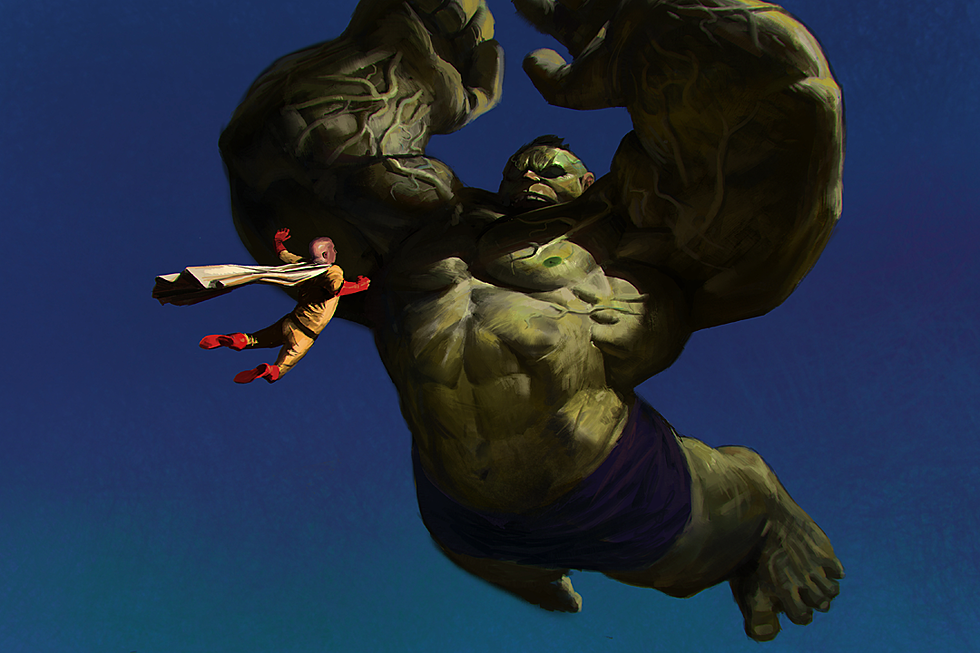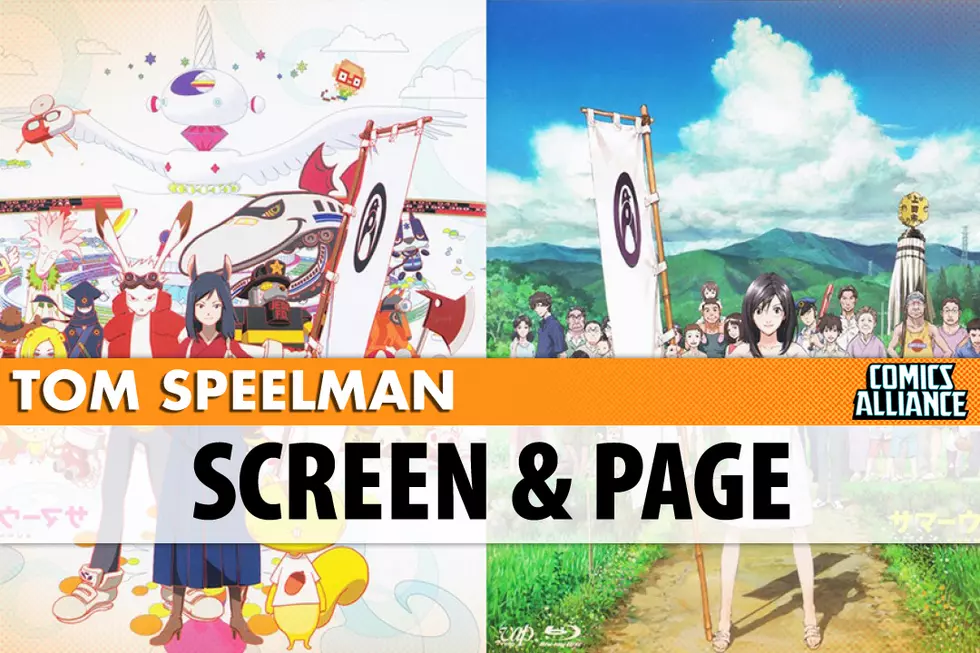
Upheaval in the Manga Industry: Piracy, Scanlations, and the Future of Digital Manga

In the past few years the manga industry has experienced upheaval, to put it lightly. A number of seemingly unconnected, but pressing, issues have turned into a perfect storm of sudden, dramatic change. Online manga piracy, generally conducted in the open on sites that contain thousands of pages of copyrighted work, finally reached the point where publishers could no longer turn a blind eye to other people profiting off their work. Falling manga sales resulted in a series of layoffs and shuttered doors around the industry. And finally, digital comics went from something off in the distance to being very real. To borrow a phrase, the future is now, and several companies have been caught flat-footed by the changeover.
The incredible growth that had defined the manga industry for several years has given way to layoffs, cutbacks, and a decline in overall business. ADV, once a major figure in the anime explosion, shuttered its manga imprint and eventually went out of business, leaving several titles up for grabs or in limbo. Tokyopop went from dominating a solid chunk of the manga market to losing several licenses and places other series on hiatus. According to Publishers Weekly, Viz Media laid off nearly 40% of its workforce this past May, despite having most of the highest-selling manga in the country as part of their catalog.While this was going on, scanlations -- where fans scan, translate, and post manga online -- expanded at a rapid rate. Free is the most attractive price of all, and scanlators were both pushing series out before they were licensed in the US, and working several hundred chapters ahead of the officially licensed manga releases. For fans, they could get what they wanted for free and you get it early. Since scans were once a major factor in the construction of manga fandom in American, they may have seemed less illicit than downloading movies or music. After all, there was no MPAA or RIAA kicking in people's doors for reading manga online, right?
Everyone knows about piracy at this point, and it functions for film, software, novels, music and comics all in pretty much the same way: Someone has created something you want, you decide you don't want to pay for it, and you download it for free. Makes sense, right? But manga piracy is a little different; it originally evolved as a thriving part of manga fandom because it filled a gap that the manga industry at the time left empty.
Twenty years ago, manga was a niche in the American comics industry. They were printed at the same size and format as American comics. Ten years after that, Tokyopop and Viz adopted the digest format and low price point that made manga a hit with everyone but the people who run the Direct Market. But manga, being Japanese comics, obviously require translation. The problem with that, for fans at least, is that it's fairly easy to find out what's popular overseas, but somewhat less easy to actually read it without any English versions for sale. Enter scanned translations, or scanlations. Fans purchased, scanned, translated, and photoshopped books to put online for other fans to download. Suddenly, American fans were placed on something like an even keel with Japanese fans, manga companies had a fairly reliable way to gauge interest in series, and the way people read comics became a little different.

But what began as a (legally questionable) way to bring something otherwise unavailable into the hands of American fans soon turned into just regular old piracy. Aggregation sites started serving as the equivalent of giant bootleg fairs, where all the manga you'd want to read was sitting right there for the taking. Google AdSense and other advertising allowed aggregators to rake in the dough. Now Googling for manga tends to bring up the scanlation first, the Wikipedia page second, and the official website of the publisher a distant fifth or sixth. OneManga, possibly the best-known aggregator, is one of the top 1,000 most visited websites in the world with 4.2 million unique visitors a month, even more page views, and plenty of ad revenue.
Well, until now. Publishers Weekly posted news recently that an "international coalition of Japanese and American-based manga publishers" are pushing back against the pirates. Thirty-six American and Japanese publishers realized that, in the face of falling profits, allowing others to make a profit off material that you legally own is a mistake.
This move has had a tremendous effect on the scanlators, and even legitimate publishers. OneManga, easily the most popular of the aggregators, has completely shut down the online reading component of its operations as of August 2nd, leaving thousands of fans in the lurch. Deb Aoki of About.com Manga reports that MangaFox, one of the major aggregators, has pulled 230 titles from its archives. While they claim to be in negotiations with the manga publishers, what's much more likely is that they're trying to figure out how to get out from under the legal threats with their wallets intact.
Aoki reports that a further 130 titles have been pulled due from MangaFox to requests from scanlation groups. The publisher coalition is going after thirty scanlation sites and no one has any interest in being next. Scanlation groups tend to be run by fans of the work, rather than major sites with buckets of ad money. A lawsuit from the coalition could easily break a normal person, and certain scanlation groups seem to have decided that it's better to be safe than sorry.

What's most interesting is the reaction from other publishers, since scanlations fill a certain niche in manga fandom that by and large isn't being filled by the publishers. There is a generation of fans who not only are okay with reading manga online, but prefer it to print. Who's going to fill that niche now that the publishers are working to eliminate scanlators? Online digital comics are the elephant in the room in the American comics industry, and it's no different in the manga industry, where officially licensed digital distribution is still in its infancy.
Viz and a few other publishers have introduced tentative digital comics initiatives like Ikki, but nothing even remotely on the scale of the (admittedly illegal and free) manga scanlation aggregators. There are precious few official digital manga, with Digital Manga Publishing, a yaoi manga publisher, leading the charge almost by default. The company is now looking to hire scanlators to translate officially licensed volumes for online publication, and while scanlators have reportedly been hired by companies before, an online-focused initiative is new and speaks to the changing needs of the manga industry.
Popular manga publisher Yen Press recently introduced "Yen Plus," a digital version of their canned print anthology, and while it currently offers only non-Japanese content, September's issue begins the roll-out of their Japanese titles, including fan-favorite "Yotsuba&!." Vertical, Inc. offers several Osamu Tezuka-related books on the iTunes store via an app called AstroBoy Magazine. Ed Chavez, Vertical's marketing czar, says that "many of these titles have been successes for us in print, and we with our license partner Tezuka Productions are looking to see if the increased digital exposure will improve sales for some of the weaker properties and maybe build a market for merchandising and other forms of media."
Negotiating digital rights of licensed material is one of the biggest issues when attempting to move manga into the digital realm. Michael Gombos, Director of Asian Licensing for Dark Horse Comics, remarked that "on some projects, there are as many as seven different rights holders, and many of them have designs for what they'd like to be doing in regard to the digital aspect." When dealing with several organizations, companies have to be able to come up with a deal that pleases everyone, from the original artist to the company that publishes the book.
 Winding through a maze of rights holders could easily set a project back months, if not years. For certain manga, that delay could mean the difference between being super popular and being a fond memory. Many popular manga have been licensed for several years at this point, long enough ago that digital rights may not even have been a concern for Stateside release. While it will undoubtedly be something added to licensing deals from here on out, some companies may be stuck in slightly outdated deals.
Winding through a maze of rights holders could easily set a project back months, if not years. For certain manga, that delay could mean the difference between being super popular and being a fond memory. Many popular manga have been licensed for several years at this point, long enough ago that digital rights may not even have been a concern for Stateside release. While it will undoubtedly be something added to licensing deals from here on out, some companies may be stuck in slightly outdated deals.
With that said... if you want to read "Naruto" or "One Piece" on your phone -- well, good luck. You're going to have to either pirate it or do without. Critically acclaimed darlings like "Pluto" or "Oishinbo" are only available in printed format. In the best case scenario, digital manga could theoretically erase the gap between Japanese and American releases. Weekly anthologies like "Shonen Jump" could enjoy nigh-simultaneous release and be collected and published in digests on a faster schedule. You could bring several volumes of manga with you on vacations without worrying about packing space or weight.
It's too soon to tell how the manga industry will change after the dust settles from the efforts against scanlation and push for more online content, but manga publishers aren't riding high on pure profit any more, and they've made it clear that fans aren't going to be able to get away with just reading for free, either. The easy answer is that they'll have to meet in the middle, and fans will have to pay for the online manga that publishers put online.
The current upheaval is going to result in a manga industry that looks a little different from the one we have now, as everyone involved is forced to evolve. We probably won't see an industry-wide digital revolution for a year or two yet, but they've at least begun the process of figuring out how to stay relevant in a changing world. There are a lot of kinks to work out, including hurdling the requirements of Japanese licensors and exactly how to deliver digital comics to the fans, but we're definitely reading manga in interesting times.
More From ComicsAlliance









